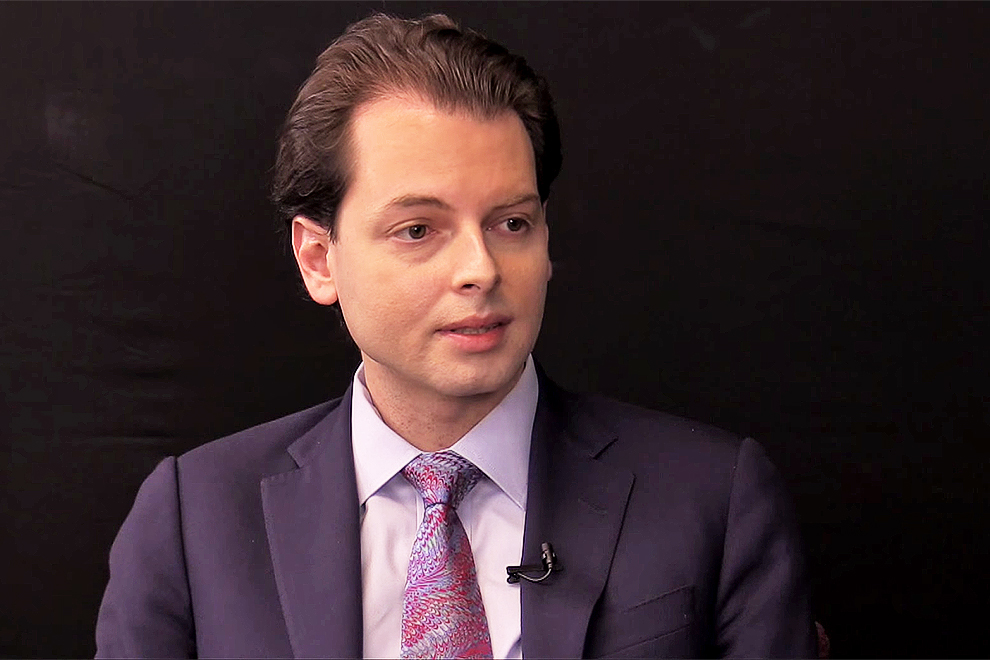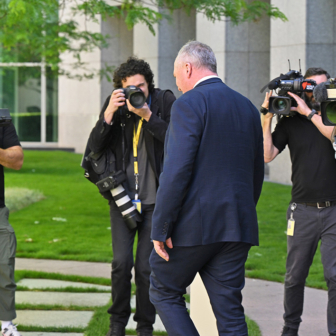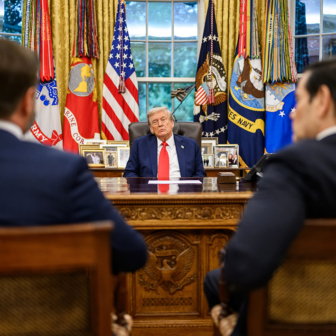When the ninth Identitarian Ideas Conference was held in Stockholm last month, it didn’t make headlines. Mainstream journalists were excluded and, as in previous years, the location was kept secret. The Swedish ethnomusicologist Benjamin Teitelbaum, who attended the 2012 conference, has described how groups of delegates meet at agreed locations and are guided to their destination on foot. This year, to avoid a cancellation of the kind that has happened several times, organiser Daniel Friberg confirmed the venue just the night before the event.
Excitement dissipated somewhat when the 370-strong assembly was kept waiting for half an hour while microphones were tested and the live stream was set up to reach a wider audience of around 20,000. In the confusion, Jason Reza Jorjani took to the podium to deliver his opening address without formal introduction. He was not about to let the significance of the occasion be diminished.
“Something truly momentous took place this winter of 2016 to 2017,” he began. He was not referring to the election and inauguration of Donald Trump, but to “a development that in the long run will prove to be even more significant for the redemption and revitalisation of our world.” He proceeded to announce the merger of three key players in the alt-right movement: the US-based National Policy Institute, headed by Richard Spencer; Henrik Palmgren’s Red Ice media network, which originated in Sweden; and Sweden-based Arktos Media, a publishing company under Friberg’s management, of which Jorjani is editor-in-chief. They would henceforth operate under the banner of the “AltRight,” with a shared website.
Tensions and disagreements were to be anticipated, Jorjani said. But they were clear in what they stood united against. “The alternative right unequivocally rejects liberal democracy.” For anyone outside the movement, this is a sufficiently confronting statement to prompt immediate disconnection. What is about to be unloaded surely goes under such labels as “fascism,” “white supremacy” or “neo-Nazism,” and who wants to hear any more?
Perhaps these labels are not misplaced: Jorjani went on to quote “the German jurist and political philosopher Carl Schmitt,” who was also, as he omits to mention, a member of the Nazi Party and prominent advocate of Hitler’s ideas of justice. But the problem with switching off – of holding up such labels like an exorcist’s crucifix against a threat of evil possession – is that you don’t learn anything.
The new AltRight convergence builds on the alliance formed last September between the Trump campaign and Steve Bannon’s Breitbart media, widely regarded as a gateway to alt-right ideas. Hillary Clinton described the Trump–Bannon alliance as “a landmark achievement” for the white supremacists of the alt-right. With the ascent of Bannon to a key role in the Trump administration, the movement is becoming a force majeure in US politics. We cannot afford to be ignorant of what they are about.
Benjamin Teitelbaum says he researched Lions in the North, his book about right-wing activism within music culture, as an ethnographer, immersing himself in the social milieu, observing, engaging in dialogue, and holding off from judgement. “Labels matter to me,” he writes on his publisher’s blog:
I almost never describe them with words like “racist,” “fascist” or “extremist.” Instead I label them as they label themselves: “nationalists.” I’m often criticised for the choice, with some alleging that my language euphemises and normalises dangerous causes. Though such concerns are valid, I have nonetheless come to think that de-escalating the tone of our language is vital if we want to better understand the political earthquakes reshaping our world.
Teitelbaum has some personal acquaintance with Friberg, and describes his transformation from a skinhead to a sharp-suited mining executive and media entrepreneur. Friberg’s agenda is to bring about a similar transformation across the alt-right movement. His view, according to Teitelbaum, is that you can’t change politics at the polling booth. You must change the culture, and to do that “you have to have people who can write, speak and produce art and media.” Friberg’s Motpol think tank in Sweden targets smart young people who will not shy away from the conceptual challenges of “metapolitics” and theoretical modelling.
Richard Spencer, the most politically aggressive member of the AltRight partnership, made a rousing speech to a gathering of white nationalists in Washington on 19 November last year, following Donald Trump’s election victory. A few days after being caught on camera leading a Nazi salute during his speech – “Hail Trump! Hail our people! Hail victory!” – he was punched in the face by a hooded assailant as he emerged from another gathering. The video clip of the incident went viral.
But Spencer is no street brawler. In a Mother Jones profile he is described as articulate and well-dressed, with prom-king good looks. He graduated with distinction from the University of Virginia, majoring in English and music, and went on to study for an MA at the University of Chicago, where he wrote a thesis on Theodor Adorno. His alt-right turn was inspired by reading Nietzsche. Like Friberg, Spencer believes in elites.
The alt-right intelligentsia habitually rails against globalisation and the colonising forces of Western liberalism. Its own “identitarian” agenda is linked with a commitment to the deep traditions that, they say, bind nations and peoples into cohesive, enduring and meaningful forms of cultural unity. They sometimes label themselves traditionalists, or paleoconservatives.
According to the mission statement on its website, Spencer’s National Policy Institute is “dedicated to the heritage, identity, and future of people of European descent in the United States, and around the world.” Andrew Joyce, editor of the institute’s journal, Radix, mounts a counterattack on left-wing “Antifa” (anti-fascist) characterisations of their agenda. “Nationalists,” he writes, “the alleged ultra-conservatives, increasingly distinguished themselves by their open desire for cultural revolution; a destruction of all that is, a revisiting of what once was, and the planned construction of what might be.”
This is putting it mildly compared with a statement Steve Bannon is alleged to have made to Washington journalist Ronald Radosh at a book launch in November 2013. “I’m a Leninist,” he said. “Lenin wanted to destroy the state… I want to bring everything crashing down and destroy all of today’s establishment.” Bannon subsequently refused to confirm the statement, but the role he has played in the past six months has done little to contradict it.
Drawing on his Goth heritage, Henrik Palmgren identifies the Red Ice enterprise with the Norse creation myth of the Ginnungagap, in which the world arises from the gap between fire and ice. “A perfect balance between these extremes creates the conditions for life… The explosive power of the sun and the coldness of space.”
Thirty-six-year-old Jorjani, a scholar of Persian cultural history with a PhD from the philosophy department at Stony Brook University, is an engaging speaker: measured and lucid, capable of holding the attention of a wide audience as he expounds the intellectual history of the Persian empire from Zoroaster to Mohammad Reza Pahlavi, the late shah of Iran.
In Prometheus and Atlas, the book based on his doctoral thesis, Jorjani also demonstrates a sophisticated knowledge of European philosophy. Grounding his case in the writings of Martin Heidegger, Jorjani presents an argument that technology is “a non-neutral world-colonising force” within modernity. He is concerned to trace the prehistory of this force back to the ancient world, characterising the Titans, Prometheus and Atlas, as “gigantic spectres of Technoscience.”
From here he develops the theme of “the spectrality of Nature,” seeking to rehabilitate a view of the phenomenal world in which the paranormal is restored to a central role and parapsychology has a determining influence on all human relations. Hardly the stuff of the average doctoral thesis, but he is evoking a fin de siècle scenario in which radical foreclosure will come unless all prospects are thrown wide open.
But the apocalyptic tendencies in the alt-right vision take full flight in the work of Alexander Dugin, a formidable spokesman for the traditionalist movement, who is known for his close ties to the Kremlin, and has been dubbed “one of the most influential intellectuals in Russia.” He’s also been called “Putin’s brain,” a title he politely declines, saying that Putin has a perfectly good brain of his own – it’s just that they think alike.
We must return to the philosophical foundations of history, Dugin declares, and “make a metaphysical effort in order to solve the current problems.” A reckoning is imminent, and Dugin adopts Heidegger’s term Ereignis, “the event” to describe what he heralds as “this sudden return to Being.”
In his 2012 book The Fourth Political Theory, Dugin dissociates himself from the paths of communism, fascism and liberalism, urging the need for a fourth way and a new Enlightenment. This begins with a rejection of the progress imperative that he associates with liberalism. “Then all that is ancient gains value and credibility.”
Whatever else may be in the mix, this part of his doctrine can surely be taken seriously and accorded respect. It does not, of course, translate easily to the world of American liberalism. Dugin is a Russian atavist, as Tolstoy was. Putin can boast that theirs is a thousand-year-old culture. Traditions of theology, literature, dance and iconography go back further than anything most American citizens can claim as their own.
What Dugin defines as “liberalism” conflates elements and positions that are diametrically opposed in most Western political systems. It means global financial capitalism, an ideology that knows the price of everything and the value of nothing, in which individualism reigns supreme and there is no such thing as society or culture. It means the mechanisation of human beings in a virtual economy that denies an existence to real industry and real production, under a new kind of global dictatorship based on the financial elite.
But just as opponents of neoliberalism may be nodding their heads, he crosses the fence and attacks the principle of human rights as another manifestation of this extreme individualism. It posits the human as an atomic unit, he says, without cultural context. In Russia, citizens do not see themselves as being apart from “the people.”
In interviews, Dugin will sound off about Western liberals for twenty minutes or more without any prompting, and his indictments become more virulent as he gathers momentum. Freedom of the individual has produced another kind of enslavement, he says, as the reign of the cyborg encroaches and natural humanity is erased by a new order of transhumans and posthumans, degenerates, freaks and monsters, “the world’s clowns.” Theirs is a domain in which “nothingness seeps through all the cracks.”
It’s the world of the simulacrum and, yes, Dugin has read Jean Baudrillard, and a lot of other works from the postmodern syllabus. He displays some of Baudrillard’s techniques of argument, including the practice of pushing a hypothesis to an extreme that opens out into a sensational version of how things are, or what they are becoming. Postmodernity, says Baudrillard, is a culture in which “the traditionally valued qualities of depth, coherence, meaning, originality and authenticity are evacuated or dissolved amid the random swirl of empty signals.”
Dugin couldn’t have put it better himself, surely, though he does put things well, at least when he is writing rather than speaking extempore in rather laboured English. Baudrillard’s America was the epitome of postmodern vacancy. Perhaps what Dugin is really talking about is not liberalism, but America itself, and its exercise of virtual colonisation through technology and the free market. Right and left hardly seem to belong in this picture at all. With its swirling hyper-realities, it is surely too unstable to have any such simple orientations.
Whether it is liberalism, or postmodernity, or just America, Dugin’s adversary is conjured as a lurid portrait of neo-totalitarianism. We are seeing a liberal dictatorship, he says, with a messianic determination to impose its values. Now that totalitarianism is dead, liberalism has discovered its own totalitarian nature. We have to stop it before it is too late, and its whole posthuman modality is upon us.
There’s demonisation going on here, but Dugin would counter that he himself gets demonised. He is, he claims, the only person to have been banned from the United States purely for his dangerous ideas.
Demonisation and counter-demonisation are the dynamics of paranoia. Surely we can do better than this, and break the cycle? Reading Dugin, or Jorjani, both of whom are fine writers and serious thinkers, I find the paranoia giving way to regret. There’s so much to agree with here, and so many stark contradictions to address.
Many of the charges Dugin levels at liberals are precisely those we have been making against ourselves through the academic disciplines of the humanities. His call for a deep decolonisation to counter the long history of cultural imperialism in Britain and Europe, his insistence on the subliminal racism of Western civilisation, the tendency to project and impose cultural values on other cultural traditions – all this sounds like Cultural Studies 101. His objections to free-market ideology and global capitalism are a pale reflection of the trenchant critiques that have been appearing on an almost daily basis from leading economists in Europe and the United States.
Yet he looks to Trump as the great hope for cultural change. Trump the global capitalist, whose home is a high-rise gilded palace above the city of New York, who hobnobs with billionaires and magnates on the golf course at weekends?
Jorjani, an American citizen, looks back to his Persian heritage for an equivalent depth of cultural identity. He declares that technoscience must be appropriated to a wider and more profound intellectual endeavour so as to “transform it into something other than a purely destructive one that uproots all traditional cultures.” Why, then, is he supporting a US president who has taken the side of a multinational corporation and shut down the Indigenous American protest over the Dakota pipeline?
The political dangers of traditionalism are obvious. It can lead to conflicts over historical boundaries. And it cultivates fierce ethnological identification – the spectre of ein Volk – attended by hostility towards peoples whose cultural worlds seem to be encroaching on one’s own. Most of the alt-right traditionalists are anti-Islam and anti-immigration.
Jorjani’s attempts to haul cultural history onto a political platform are certainly questionable, and they have led to an ill-judged suggestion from the faculty at Stony Brook that his doctorate should be reviewed. In response to an abstract of Jorjani’s thesis published on the philosophy blog Leiter Reports, one contributor contended that “this nature worship, technophobia, worshipful reversion to Greek myths… is the common coin of brown shirts when they’re doing their best to be obscure, intellectual and highbrow.”
I don’t recall the thousands of books on technophilia and technophobia published in the 1990s being implicated in any campaigns for the resurrection of the Third Reich. And far from being “worshipful” towards the ancient Greeks, Jorjani argues that their cultural achievements did not measure up to those of the Persians and Egyptians. It’s true that the philosophers with whom Jorjani most readily engages – Kant, Nietzsche, Feyerabend and Heidegger – are associated with the ideologies of National Socialism, but the discursive world of philosophy is no anodyne environment. Many twentieth-century thinkers, including Jacques Derrida, have paid close attention to Carl Schmitt’s ideas.
Jorjani recently sought to distance himself from Perennialism, an aspect of traditionalism that posits some higher order of wisdom at the heart of an enduring culture. “Our greatest enemy in this venture [an Iranian renaissance],” he said, “is not Islam, but the Traditionalist mentality of Javidan Kherad [eternal wisdom] or ‘Perennial Philosophy’ that cannot tolerate fundamental uncertainty and honest intellectual conflict. This Javidan Kherad… has its origins in a false reconstruction of Sassanian culture on the basis of an Islamic-Mongol mentality that is truly going to be the death of us if we do not have the courage to free ourselves from it.”
The appropriate response to Jorjani and others of the alt-right intelligentsia is surely to question their arguments through an honest public exchange of ideas. Tensions over the rise of the alt-right are only exacerbated by an absence of substantive debate. Typically, the leading spokesmen of the movement (and yes, they are all men) address like-minded audiences in forums designed to promote their agenda. They deliver monologues rather than engage in dialogue. They do protracted interviews on Red Ice radio, during which they are supportively prompted by presenter Henrik Palmgren. They don’t like being labelled and stereotyped in the press, yet the labelling and stereotyping of liberals is part of their own core business.
Paranoia is the real enemy. It is an inflammatory and contagious disease, and no culture is immune to it. We are a long way from confrontation with a fully-fledged and militarised movement for Aryan supremacy, and invoking the prospect only invites it. Why do so, when more concerted attempts at communication might change the dynamics?
Whether the AltRight merger Jorjani announced in Stockholm constitutes a momentous development is open to question. None of the three organisations involved has a vast following. Audience figures for Red Ice television and radio peak at around 100,000. Spencer addresses crowds of a few hundred people, and items published by his National Policy Institute typically attract no more than a few dozen shares. Arktos media is evidently a flourishing concern, but its books don’t make the bestseller lists.
Jorjani’s claim that the merger has some redemptive global significance is based less on the prospect of mass impact than on the anticipation of a cultural revolution led by a new elite, whose currency is ideas. “Politics is downstream from culture,” according to Andrew Breitbart, Bannon’s former business partner, and founder of Breitbart News. Friberg’s strategy of forming an intellectual elite is born of the same conviction.
This is quite contrary to the view most educated liberals would have of the thinking fostered in the new White House administration, but it is echoed repeatedly in Breitbart editorials. “An Establishment Conservative’s Guide to the Alt-Right,” published in Breitbart in March 2016, states that “one thing stands out above all else: intelligence,” and describes the leaders of the movement as “dangerously bright.” Their ideas may be dangerous, but they are born of argument, and may be subject to negotiation and change in response to it. •




